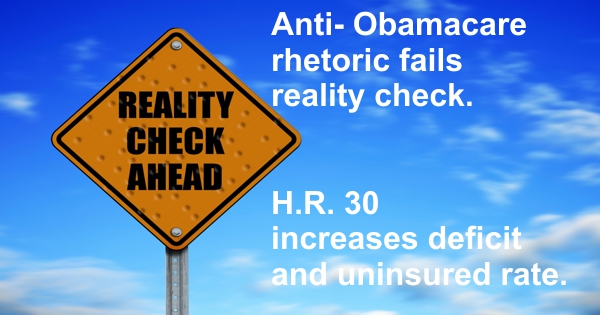*
It is true that Obamacare reduced the deficit and decreased the uninsured rate
The changes that the GOP are attempting to make to the Affordable Care Act (aka, Obamacare, ACA) to appease selfish employers will in fact help the employers at the expense of us all. Worse, it will exacerbate the plight of the uninsured and put a bigger burden on government programs, specifically Medicaid.
Republicans have led Americans to believe that Obamacare was costing jobs and needed to be modified in an employer beneficial manner even as real time evidence is that employment numbers are way up.
Republicans claim that the employer mandate makes America a part-time work nation because it forces a penalty on employers with over 50 employees if they do not provide insurance for employees working more than 30 hours per week.
Vox’s Matthew Yglesias got it right. On the reason why Obamacare designers chose the threshold as 30 hours he wrote the following.
Except it turns out that the authors of the ACA weren’t idiots. As Yuval Levin explained in a recent National Review item, the 30 hour threshold was established “in part to limit the degree to which employers cut worker hours by putting the cut-off well below the number of hours that most workers put in.” Sherry Glied and Claudia Solis-Rosman have shown that while working slightly more than 40 hours is common, working slightly more than 30 hours is rare. In other words, few workers are at risk of having hours slashed from 31 per week to 29, but many could be cut back from 41 to 39.
On whom would be winners and losers if the bill were to pass he wrote.
While a shift from a 30-hour definition to a 40-hour definition would exacerbate the problem of hour cuts, it would help solve one very serious problem — the problem of rich businessmen who would like to see higher profits rather than lower profits.
Lifting the hours threshold would automatically cause millions of workers to fall below the limit, saving their employers money in insurance premiums and fees to the government. And lifting the hours threshold would also make it easier for employers to monkey with workers’ schedules to get them redefined as part-time.
At a time when corporate profits as a share of the economy are abnormally high, boosting profits at the expense of workers’ health insurance coverage isn’t necessarily a great political slogan. But it’s still something that business owners and managers care passionately about, and business priorities tend to get a thorough airing on the Hill.
Well the CBO has completed its analysis of H.R. 30, Save American Workers Act of 2015. The report is not good. The report is however what was expected. Here is the summery of the report.
H.R. 30
Save American Workers Act of 2015
As introduced in the House of Representatives on January 6, 2015
SUMMARY
H.R. 30 would change how penalties are imposed under the Affordable Care Act (ACA) on employers that do not offer insurance (or offer insurance that does not meet certain criteria) and that have at least one full-time employee receiving a subsidy through a health insurance exchange The legislation would raise the threshold that defines full-time employment from 30 hours per week under current law to 40 hours per week, and it would apply that higher threshold in two ways in the calculation of penalties.
As a result, H.R. 30 would reduce the number of employers that are assessed penalties and lower the penalties assessed against some employers, which would decrease the amount of penalties collected. Because of the changes in who would pay penalties and the amounts
they would pay, CBO and the staff of the Joint Committee on Taxation (JCT) estimate that enacting H.R. 30 would also change the sources of health insurance coverage for some people, and those changes would have further budgetary effects. Specifically, in years after 2015, CBO and JCT estimate that the legislation would:
- Reduce the number of people receiving employment-based coverage—by about 1 million people;
- Increase the number of people obtaining coverage through Medicaid, the Children’s Health Insurance Program (CHIP), or health insurance exchanges—by between 500,000 and 1 million people; and
- Increase the number of uninsured—by less than 500,000 people.
As a consequence of the changes in penalties and in people’s sources of insurance coverage, CBO and JCT estimate that enacting H.R. 30 would increase budget deficits by $18.1 billion over the 2015-2020 period and by $53.2 billion over the 2015-2025 period. The 2015-2025 total is the net of $66.4 billion in additional on-budget costs and $13.2 billion in off-budget savings (the latter attributable to increased revenues). Although enacting H.R. 30 would affect direct spending and revenues, the provisions of the Statutory Pay-As-You-Go Act of 2010 do not apply to the legislation because it includes a provision that would direct the Office of Management and Budget to exclude the estimated changes in direct spending and revenues from the scorecards used to enforce the pay-as-you-go rules.
The more things change the more they stay the same. Some of you may be too young to remember when then GOP candidate Reagan promised Americans that he would increase military spending, decrease the deficit, and reduce taxes during the Republican primaries. George H. W. Bush called it then voodoo economics. It was impossible. Americans are still paying for that severe misstep.
Americans must not once again fall for rhetoric not backed by facts. We continue to pay dearly for words that do not match neither deeds nor reality based outcomes.
Viewers are encouraged to subscribe and join the conversation for more insightful commentary and to support progressive messages. Together, we can populate the internet with progressive messages that represent the true aspirations of most Americans.
